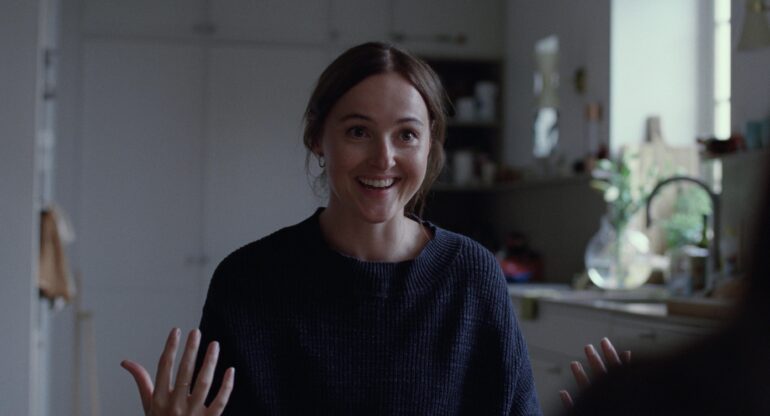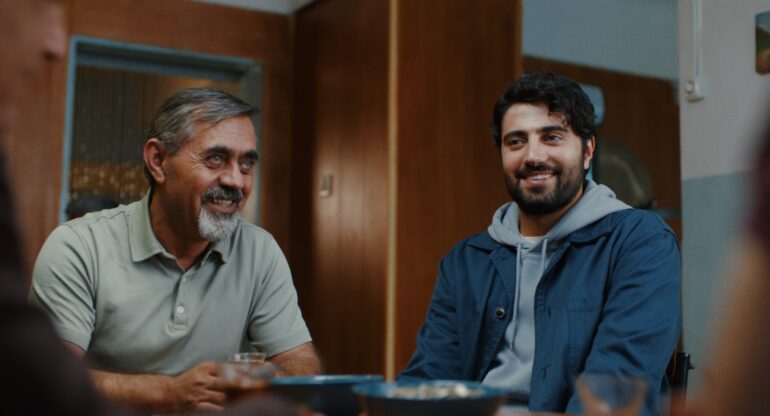Written by: Mariana Hristova
14.11.25
Two very different cultural contexts and events bridge borders and share a common belief in the power of Nordic storytelling.
After exploring the prominent Nordic presence at major film festivals in Poland and Latvia – the Warsaw Film Festival and the Riga International Film Festival, respectively – the Nordisk Film & TV Fond continues tracing Nordic influence in Eastern Europe, this time through two smaller-scale, yet no less important, events in the Balkans and just beyond the EU, with satellite connections in the Baltics.
This autumn, Bulgaria’s Kinomania festival (13–30 November), organised since 1987 by the National Palace of Culture, and the Northern Lights Film Festival (3–23 November), launched by the Finnish Embassy Liaison Office in Minsk in 2015 and now operating in exile from Belarus, reaffirm how Nordic cinema continues to resonate far beyond its home region, even under radically different circumstances.
Sofia’s Kinomania: Tenderness vs. Ignorance
Kinomania in Sofia has developed its Nordic Focus into one of the festival’s key attractions. Although the section officially became part of the programme only in 2023, when the current artistic director Hristo Hristozov took up the position, he had already been showcasing films from the region since 2017 in a separate event, while the foundation for promoting Nordic cinema had been laid by another team back in 2008.
“It is a priority for the simplest reason,” he tells us. “Nordic films rarely receive meaningful distribution, and yet they have fans. Besides, they rank among the best of the year.”
Hristozov borrowed Joachim Trier’s vital line ‘Tenderness is the new punk’ from his Sentimental Value (Affeksjonsverdi) press conference in Cannes earlier this year as a slogan for the entire Kinomania 2025: “We need tenderness in Bulgaria – in the form of empathy, constructive dialogue, attention toward ourselves,” he explains, and continues: “In Cannes, Trier contrasted tenderness with machismo. I, on the other hand, would contrast it more with ignorance.”
This year’s selection in Sofia embraces both established names and cult favourites. The high-profile opening screening of Morten Tyldum’s Headhunters (Hodejegerne) from 2011, based on the same title novel by Jo Nesbø, celebrates the arrival of the bestselling Norwegian author, who will appear for a Q&A before greeting readers with his new novel in a parallel literary event. Other highlights include the Finnish co-production The Summer Book, based on Tove Jansson’s novel, and Jukka Vidgren & Juuso Laatio’s comedy Heavier Trip (Hevimpi Reissu), co-produced by Bulgarian filmmaker and producer Tonislav Hristov; the iconic 1968 Swedish film The Girls (Flickorna) by Mai Zetterling, honouring Bibi Andersson’s 90th anniversary; as well as the hits Dreams (Drømmer) by Dag Johan Haugerud, The Ugly Stepsister (Den Stygge Stesøsteren) by Emilie Blichfeldt, The Last Viking (Den sidste viking) by Anders Thomas Jensen, and, of course, Joachim Trier’s Sentimental Value.
Still, Hristozov admits he must carefully consider local tastes. “Curiosity is not always the audience’s driving force,” he observes. “Names, established authorities, familiar topics are what lead. So, I try to ensure the films are also relatively popular.”
Alongside the screenings, Kinomania will also host the launch of the book “Scandinavian Cinema: Styles and Motifs”, a new study by Bulgarian film scholar Mirella Vasileva, which appears to be the first of its kind in the country. The book traces a century of filmmaking in Sweden, Denmark and Norway, revealing how strong national models foster daring artistic visions. Vasileva admires the “experimental nature” of the region’s cinema, and its bravery to “explore themes and use techniques that would be considered taboo elsewhere”, its frank examination of “the weaknesses of human character and their destructive power”, and its ability to inspire “acceptance of dysfunctionality in human relationships while granting space for empathy and growth”, according to Vasileva.
Belarus’ Northern Lights: Cinematic Ties Beyond Borders
Across the EU border, the ambition to share Nordic films has taken on a different urgency. Founded in Minsk in 2015, the Northern Lights Film Festival once filled Belarusian cinemas with Nordic works, supported by strong local admiration for Nordic culture. Today, in difficult political circumstances, the event survives online for audiences inside Belarus, while also holding limited physical screenings in Tallinn, Vilnius, and Warsaw, cities with a strong Belarusian diaspora.
Artistic director Volia Chajkouskaya remembers the spark clearly. “It was supposed to be a one-time event, initiated by the Liaison Office of Finland in Minsk,” she says. “I immediately saw the potential to turn it into an annual festival, as there was a special admiration of Nordic cinema.” The students from the Swedish Centre in Minsk, where people could learn Scandinavian languages, were the main fans of the festival.
After 2020, everything changed. “Due to political issues, we are not able to organise the festival onsite in Belarus anymore,” she explains. “For already five years, we survive in exile.”
Despite these constraints, the festival has maintained a strong curatorial identity. The 11th edition is shaped around the concept Just Kids, focusing on childhood, trauma, and possible future. “We invite films that speak to the festival’s concept,” Chajkouskaya notes. “Since I am also a poet, for the last three years our manifestos are poems.”
The festival’s programme offers a balanced mix of films from the European North, including Baltic, Belarusian, and Ukrainian titles. This year’s Nordic highlights include Norway’s documentaries A New Kind of Wilderness (Ukjent Landskap) by Silje Evensmo Jacobsen and Flophouse America by Monica Strømdahl (co-produced with the Netherlands and the USA), as well as the animated feature The Polar Bear Prince (Kvitebjørn) by Mikkel B. Sandemose; Finland’s The Labour of Pain and Joy (Kivun ja ilon työ) by Karoliina Gröndahl; Sweden’s Zlatan’s Nose (Zlatans näsa) by Nils & Olle Toftenow and Mathias Rosberg; along with The Girl with the Needle (Pigen med nålen) by Magnus von Horn and My Uncle Jens (Onkel Jens) by Brwa Vahabpour – both co-productions between Nordic and Eastern European countries, the former between Denmark, Sweden, and Poland, and the latter between Norway and Romania.
The Warsaw live events are strengthened with guests such as filmmaker Magnus von Horn, participating in a career talk in the side section Nordics Explain, as well as Nils Toftenow and Claes Ekman, the director and protagonist of Zlatan’s Nose.
Northern Lights also champions Belarusian filmmakers working without state support, and showcases urgent cinema responses to political oppression. The special section Resilience, supported by German Films, embodies what the festival itself has become: “Resilience is not just survival,” says Chajkouskaya. “It is an act of defiance and hope.”


